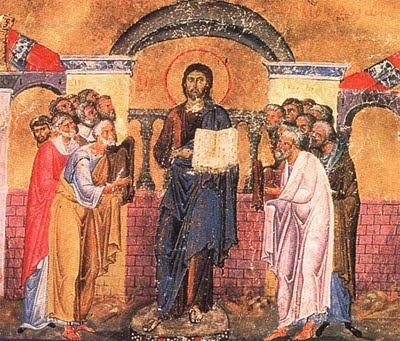468. THE INTERNAL SENSE
It is clear from what was stated and shown in the previous chapter that names meant heresies and systems of doctrine. From that it becomes clear that the names in this chapter do not mean specific individuals but other things that existed. Here they mean systems of doctrine or Churches which, though they underwent certain changes, were preserved from the time of the Most Ancient Church down to that of Noah. Now it so happens that every Church in the course of time gets smaller until at length it remains among only a few people. The few with whom it remained at the time of the Flood were called Noah.
[2] The fact that the true Church gets smaller and remains among the few becomes clear from other Churches which have in a similar manner got smaller. In the Word those who remain are called 'the Remnant' and 'that which is left', and indeed people 'in the midst (or the middle) of the land'. What applies in general applies in particular also; that is, what is true of the Church is equally true of individuals. If the Lord did not preserve remnants with each individual he would inevitably perish in eternal death, for those remnants contain spiritual and celestial life. The same applies to what is general or universal; were there not always some people among whom the Church, or true faith, existed, the human race would perish. For as is well known, a city, even a whole kingdom, is preserved for the sake of a few. These factors are akin to the heart in man: as long as the heart is sound the surrounding organs can go on living. But when it is weak, deterioration sets into them all and the person dies. Final remnants are meant by Noah, for with the exception of these, as is clear from verse 12 of the next chapter, 'the whole earth was corrupt'.
[3] The remnants residing with the individual or within the Church are frequently the subject in the Prophets, as in Isaiah,
He who remains in Zion, and he who is left in Jerusalem will be called holy to Him, everyone who has been written for life 1
in Jerusalem, when the Lord will have washed the filth of the daughters of Zion and washed away the blood 2
of Jerusalem from its midst. Isaiah 4:3-4.
Here holiness is attributed to the remnants, which mean remnants of the Church, and also of the member of the Church, for those left in Zion and in Jerusalem could not be holy people merely because they had been left there.
Similarly in the same prophet,
On that day, the remnant of Israel and those of the house of Jacob that escaped will no more lean on him that smote them; but they will lean upon Jehovah, the Holy One of Israel, in truth. A remnant will return, the remnant of Jacob, to the God of power. (Isaiah 10:20)
In Jeremiah,
In those days and in that time the iniquity of Israel will be sought, but there will be none, and the sins of Judah, but they will not be found; for I will pardon him whom I shall make one that is left. Jeremiah 50:10.
In Micah,
The remnant of Jacob will be in the midst of many peoples, like dew from Jehovah, like showers on the grass. Micah 5:7.
[4] That which is left, or the remnant, whether of the individual or of the Church, was also represented by tenths, which were holy. And any number involving ten was consequently holy too. Ten therefore has reference to things that are left over, as in Isaiah,
Jehovah will remove man far away, and there will be many forsaken places in the midst of the land; yet there will be a tenth part in it, and this will return; it will be a wiping out like an oak or a terebinth when the stump is cast away from them. The holy seed is its stump. Isaiah 6:12-13.
Here that which is left is called 'the holy stump'. In Amos,
Thus said the Lord Jehovah, The city that goes forth a thousand will have a hundred that are left, and that which goes forth a hundred will have ten that are left to the house of Israel. Amos 9:3.
In these and many other places the internal sense means remnants, also the subject here. The fact that a city is preserved for the sake of the remnant of the Church is clear from what Abraham was told concerning Sodom, Abraham said, Perhaps ten may be found there; and He said, I will not destroy it for the sake of ten. Genesis 18:32.
Footnotes:







